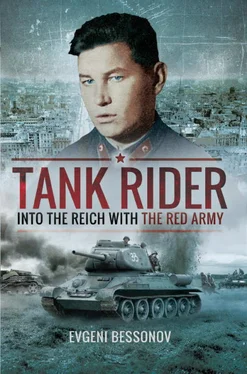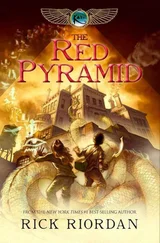At dawn on 22 April we approached a high railway embankment and were stopped by intensive fire. We could have quickly destroyed the German delaying force and moved on forward, but the problem was that the passage under the railway bridge was filled with sand and fortified with big logs, connected with metal girders. We did not manage to destroy that barricade. The tanks turned to the right and drove to look for a place to cross the railway, while we, the tank riders, were thrown off so we could break through the defences on the embankment. That time it was the 2nd and the 3rd companies and Lieutenant Popov’s machine-gunners that captured the embankment. I crossed the embankment after the 3rd company. Lehnin village was behind the embankment; the 2nd and the 3rd companies assaulted the village right from the embankment, while I moved a bit to the right with my company, on the road that went out from that village. Three or four T-34 tanks arrived at the scene in that moment, and sitting on one of them was our political officer Captain Gerstein. The tanks stopped, Gerstein jumped off the tank and for some reason shouted: ‘Bessonov, quickly get on the tanks, quickly!’ We ‘saddled’ the tanks and moved forward. I was on the first tank with some of my men, while Captain Gerstein and the rest of the company were on the other tanks. I do not remember where the battalion commander and company commander were at that time. We rode on tanks for some time and all of a sudden came under fire from trenches on the right side of the road. The tanks stopped, I ordered: ‘Dismount! Fire! Fire!’ and the whole company ran towards those trenches, firing nonstop from our submachine-guns. Right in front of me there was a Fritz in a trench. I tried to cut him down with my German submachine-gun, the one that used to hang over my bed during training, but apparently during the skirmish at the embankment some sand had got into the bolt. I jerked the bolt, pulled the trigger, but it did not fire. The German did not think long, grabbed his rifle and aimed at me. I had a thought flashing in my head: ‘This is the end, Bessonov, your life is over.’ Right at that time a submachine-gun burst sounded in the air and the German dropped dead to the bottom of his trench. It turned out that it was Drozd who cut him down with a Soviet PPSh submachine-gun, which never jammed in battle, in any situation. Why the hell did I carry that German submachine-gun? We jumped across the trenches, some Germans fled, while the rest were killed. Andrey took away my submachine-gun, took out the clip and threw the submachine-gun away. He gave me the clip, as its ammo could be used in my Walther pistol. We lay down after capturing the trenches, as we were too exhausted to run, but then Gerstein arrived at the scene and ordered: ‘Forward, Bessonov, don’t stop, we must capture those houses! Come on, get soldiers up and attack. Faster!’ I had never seen him in the attacking line before that.
I got my soldiers up and we rushed into those houses, which were some 250 or 300 metres away. There were just three or four houses there. The Germans fled; even their two self-propelled guns drove away at high speed on a road that had trees planted on its sides. The alley went to the village, which we could see at some 300 metres. One self-propelled gun managed to knock out one of our T-34 tanks in an ambush. The tank was burnt out and the whole crew was killed. All these things happened before our eyes – it was so horrible that I do not even want to write about it. We moved forward a bit and dug in by a hedge that edged an open field that stretched to the next village. I sent one squad down the lane to check out where the Fritzes were, but the squad came under fire and dug in on both sides of the lane. The 2nd and 3rd companies of the battalion arrived and dug in on our left flank. We did not have any further orders. We had time to feed the soldiers. We found some food, cooked it and satisfied our hunger.

At midday a regiment of 37 mm anti-aircraft guns, eight guns and eight trucks, quickly rushed pass our positions. I have no idea why the regiment commander sent them there. The trucks stopped in the open, the guns turned their barrels towards the enemy and opened fire on the village. They did not fire for long, as the Germans returned fire with artillery and all the crews were killed or wounded, and almost all the guns were destroyed. Then the commander of the regiment arrived on the scene – he was drunk and could barely stand on his feet. An orderly soldier was with him. This Colonel behaved in a strange manner: first he ran out into the field, but the Germans fired on him and he had to return to the gardens. After that he started to run back and forth along our line and try to get the battalion to attack. As we did not have any orders from our command for attack, I ran off to get out of harm’s way, to the combat outpost and lay down there. The Colonel was getting more and more angry, waving his pistol in the air, cursing and shouting, but no one from our battalion reacted and no one was going to obey him. The Colonel got so mad that he grabbed the submachine-gun from his orderly and executed 3rd platoon leader Lieutenant Antipov on the spot in his foxhole. Antipov was around 35 years old. He was a calm and slow person who had just recently arrived in the battalion. He was a quiet and regular officer. I wanted to kill that Colonel or at least wound him; I even ran forward, a bit closer to the enemy, so that my shot could be perceived as a German one, especially given the fact that they continued firing at us. But my hand did not lift against my countryman. I could not do it; I just did not have the stomach for it. The deputy chief of staff, Senior Lieutenant Mikhail Romanov, also wanted to shoot the Colonel, but, apparently, he also did not have the stomach to shoot a Soviet citizen, even such a filthy one. Soon after that officers from the anti-aircraft regiment staff came running and took the Colonel away by force to their HQ. I never saw him again, but our comrade was killed, not in battle, but by a drunken bastard. This Colonel also destroyed his regiment by being drunk – a sober person just could not do such a stupid thing. There are really some bastards in this world… I heard later that the Colonel was eventually brought before a court-martial.
After the Colonel was taken away by his staff officers, a female medic came along with a wounded soldier from an anti-aircraft gun crew. She ran several more times to the destroyed guns, each time coming back with a wounded soldier, carrying him on a raincoat or on her back. She was creeping there under enemy fire and apparently got tired, or maybe she was scared. Anyway, she sat on the bottom of my foxhole and burst into tears. After she calmed down a bit, she asked for a smoke and then for a drink. She stayed in the foxhole for a little while and then again went on to rescue more wounded, saying farewell with: ‘Lieutenant, wish me luck, so that I might survive this bloodbath.’ A brave girl.
Soon afterwards the battalion left that area, and again we drove on tanks in the night to complete our tasks. However, that night march ended up with a comedy, as people say, enough to make a cat laugh – we were driving almost the whole night (the tank riders were dozing off) and came back to exactly the same place from which we had started our march in the evening. I do not remember such an embarrassment for the Brigade’s or the tank regiment’s staffs in other operations. It is quite impossible to get lost in Germany: all roads have road signs with names of localities, directions and distances. This was how we again lost time, again falling behind our schedule. Then we had to speed up and complete the mission. That time I was not in front of the Brigade – another company was the Brigade’s vanguard. War is war, all kinds of things happened, even funny things. Regardless of how hard it was for us, junior officers and privates, we had our sense of humour. As soon as we had a break from fighting, one could hear laughter, jokes and stories – Lieutenant Grigori Kes, the machine-gun platoon leader from the battalion’s machine-gun company, was especially skilful in that. A happy and cheerful person, he was respected by all.
Читать дальше













